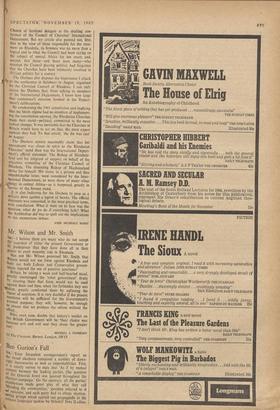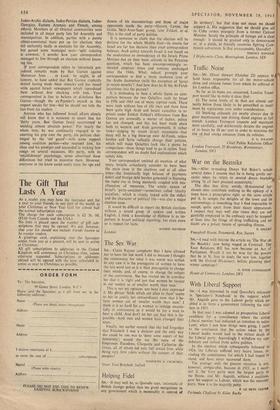Ben Gurion's Fall SIR — Your Jerusalem correspondent's report on the
Israel elections contained a number of down- ,right inaccuracies as well as improbabilities. First, It is utterly untrue to state that 'As if by mutual consent between the leading parties, [the question of the Oriental Jews] was ignored throughout the election campaign.' On the contrary, all the parties' manifestoes made great play of what they call 'blending the communities,' speeches referred to it Q11 nauseant, and each party had its ethnic election- eering groups 'which carried out propaganda in the various languages spoken by Oriental JewS (Ladino, Judeo-Arabic dialects, Judeo-Persian dialects, Judeo- Georgian, Eastern Aramaic and French, . among others). Members of all Oriental communities were included in all major party lists for Assembly and municipalities. In addition, parties with a purely ethnic-communal basis put up for election; they did uniformly badly in elections for the Assembly, but gained some municipal seats—'split ticketing is common.' I wonder how your correspondent managed to live through an election without know- ing this. If your correspondent refers to 'extremely pre- judiced remarks made by Ben Gurion against Moroccan Jews . . . in Look,' he ought, in all honesty, to have added that Ben Gurion explicitly denied having made these remarks and has issued writs against Israeli newspapers which reproduced them without first checking with him. Your correspondent is free to believe or disbelieve Ben Gurion—though the ex-Premier's record in this respect speaks for him—but he should not hide the fact from his readers. '
Anyone who has followed Israeli affairs closely will know that it is nonsense to assert that for 'thirty years, Ben Gurion [was] accustomed to wielding almost absolute power.' For nearly the whole time, he was continually engaged' in re- asserting his grip over the party, his policies chal- lenged by the 'old guard'—with some support among coalition parties—who resented him, his ideas and his proteges and succeeded in making him resign on several occasions. His party, with its 'establishment' psychology, never advertised these differences but tried to minimise them. However, everyone in the know could easily trace the ups and
downs of his manoeuvrings and those of major opponents inside the party—Sharett, Lavon, the Golda Meir-Aran-Sapir group, later Eshkol, et al. This is the stuff of party politics.
It is nonsense to claim that the election will be decisive for the whole Middle East—its results for Israel are far less decisive than your correspondent believes. Arab policy towards Israel is not based on the moderation or immoderacy of the Israeli Prime Minister but on their basic attitude to the Palestine question, which has been uncompromisingly re- iterated umpteen times and remains unchanged since the 1940s. What, indeed, prompts your correspondent to find a 'more moderate tone of the Arabs themselves (with the exception of Syria) in recent months'? And how does he fit the Al-Fatah incursions into the picture?
It is misleading to base a whole thesis on com- parison between the two Qalqiliya raids by Israel in 1956 and 1965 out of many reprisal raids. There were raids without loss of life then and there have been quite high Arab and Israeli casualties in re- prisals under Eshkol. Eshkol's differences from Ben Gurion are avowedly a matter of tactics; policy has not changed, and this has been made plain both to western and Arab governments. It rather looks—judging by recent Israeli statements—that there will be a big blow-up over Al-Fatah, unless Jordan and Syria radically change their policies, which will make Qalqiliya look like a picnic by comparison—these things tend to go in cycles. Your correspondent will no doubt find explanations which satisfy him.
Your correspondent omitted all mention of what many Israelis articulately consider to have been the main issue in the elections and at all other times—the historically high balance of payments deficit and foreign debt burden generated in financing the rapid rise in living standards coupled with mis- allocation of resources. The whole nature of Israel's 'party-socialism'--sometimes called 'charity socialism,' which is closely linked with the deficit and the character of political life—was also a major election issue.
It would be difficult to report the British elections• without a sound grasp of spoken and written English. 1 think a knowledge of Hebrew is as im= portant in Israeli political reporting; but even more so is respect for facts.
London



































 Previous page
Previous page